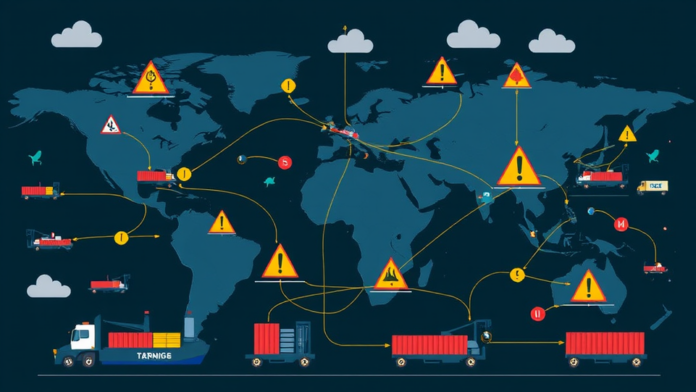Introduction to Global Supply Chain Disruptions
Definition and Overview
Global supply chain disruptions refer to significant interruptions in the flow of goods and services across international borders. These disruptions can arise from various factors, including natural disasters, geopolitical tensions, and pandemics. Such events can severely impact businesses, leading to increased costs and delays. It’s crucial to understand these dynamics. They affect profitability and operational efficiency.
In recent years, the COVID-19 pandemic has highlighted vulnerabilities in global supply chains. Many companies faced shortages and logistical challenges. This situation prompted a reevaluation of supply chain strategies. Businesses must adapt to survive. The need for resilience has never been more apparent.
Recent Trends and Events
Recent events have underscored the fragility of global supply chains. For instance, the Suez Canal blockage in 2021 disrupted trade routes for weeks. This incident highlighted how a single event can ripple through the economy. Many businesses faced delays and increased shipping costs. Such disruptions can erode profit margins significantly.
Additionally, ongoing geopolitical tensions have led to trade restrictions. These restrictions complicate sourcing strategies for many companies. He must consider alternative suppliers to mitigate risks. The need for diversification is clear. Companies that adapt quickly can maintain a competitive edge.
Impact on Business Operations
Operational Challenges
Supply chain disruptions create significant operational challenges for businesses. For example, delays in receiving raw materials can halt production lines. This situation leads to increased operational costs. Companies may need to expedite shipping, which is often expensive. He must weigh these costs against potential revenue losses.
Moreover, workforce management becomes complicated during disruptions. Employees may face uncertainty regarding job security. This uncertainty can affect morale and productivity. Companies should communicate transparently with their teams. Clear communication fosters trust and stability. Ultimately, effective management of these challenges is crucial for maintaining competitiveness.
Financial Implications
Supply chain disruptions can lead to significant financial implications for businesses. For instance, increased costs for materials and shipping can erode profit margins. This situation forces companies to reassess their pricing strategies. He must consider whether to absorb costs or pass them to consumers.
Additionally, cash flow issues may arise due to delayed deliveries. Companies may struggle to meet financial obligations, impacting their creditworthiness. Maintaining liquidity is essential for operational stability. He should prioritize cash flow management during disruptions. Effective financial planning can mitigate risks. Ultimately, understanding these implications is vital for long-term success.
Tax Considerations for Affected Businesses
Tax Relief Options
Affected businesses may explore various tax relief options to alleviate financial strain. These options can include:
Additionally, businesses may qualify for specific industry-related relief measures. Understanding eligibility criteria is essential. He must consult with a tax professional for tailored advice. Proper planning can lead to substantial savings.
Impact on Tax Compliance
The impact of supply chain disruptions on tax compliance can be significant for affected businesses. For instance, delays in financial reporting may lead to missed deadlines for tax filings. This situation can result in penalties and interest charges. He must prioritize timely submissions to avoid these costs.
Additionally, changes in revenue due to disruptions can complicate tax calculations. Businesses may need to adjust estimated tax payments accordingly. Accurate record-keeping becomes essential during this period. He should maintain detailed documentation of all financial transactions. This practice can support claims for deductions and credits. Ultimately, proactive tax management is crucial for maintaining compliance.
Strategic Responses to Supply Chain Disruptions
Adapting Business Models
Adapting business models in response to supply chain disruptions is essential for maintaining competitiveness. Companies can consider several strategies to enhance resilience. These strategies may include:
Additionally, businesses may need to pivot their product offerings. This flexibiliry allows them to meet changing consumer demands . He must remain agile in a dynamic market. Ultimately, strategic adaptation is crucial for long-term sustainability.
Leveraging Technology and Innovation
Leveraging technology and innovation is crucial for businesses facing supply chain disruptions. For instance, adopting cloud-based solutions can enhance collaboration among teams. This approach improves communication and data sharing. He can streamline operations effectively.
Moreover, utilizing artificial intelligence can optimize inventory management. AI algorithms predict demand patterns, reducing excess stock. This technology minimizes waste and lowers costs. He should consider automation to improve efficiency. Robotics can speed up production processes significantly. Embracing these innovations is essential for staying competitive.
Future Outlook and Recommendations
Long-term Strategies for Resilience
Long-term strategies for resilience are essential for businesses navigating supply chain challenges. Developing a robust risk management framework can identify potential vulnerabilities. This proactive approach allows for timely interventions. He should regularly assess supply chain dependencies.
Additionally, fostering strong relationships with suppliers enhances collaboration. This strategy can lead to better negotiation terms and reliability. He must prioritize transparency in these partnerships. Investing in employee training also builds internal capabilities. Skilled employees can adapt to changing market conditions. Ultimately, a comprehensive strategy is vital for sustained success.
Policy Recommendations for Businesses
Policy recommendations for businesses should focus on enhancing supply chain resilience. First, he should advocate for diversified sourcing strategies. This approach reduces dependency on single suppliers. It minimizes risks associated with disruptions.
Second, businesses must engage in continuous risk assessment. Regular evaluations can identify emerging threats. He should implement adaptive strategies based on these assessments. Additionally, fostering collaboration with industry peers can lead to shared insights. This collaboration can enhance overall supply chain stability. He must prioritize innovation to stay competitive. Embracing new technologies is essential.

